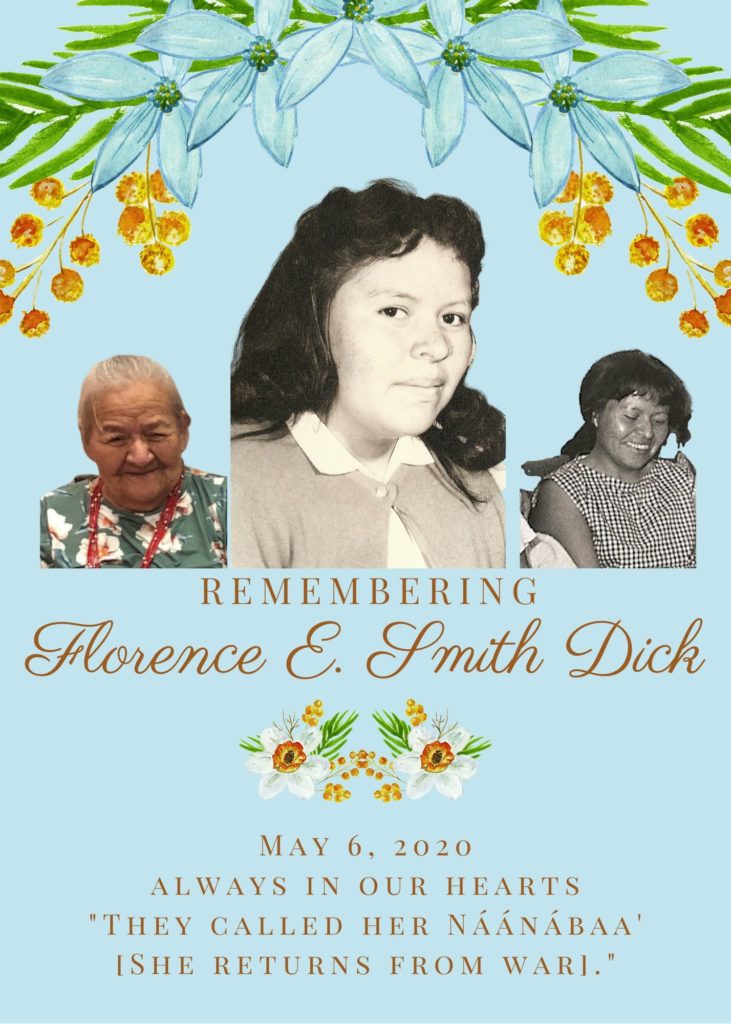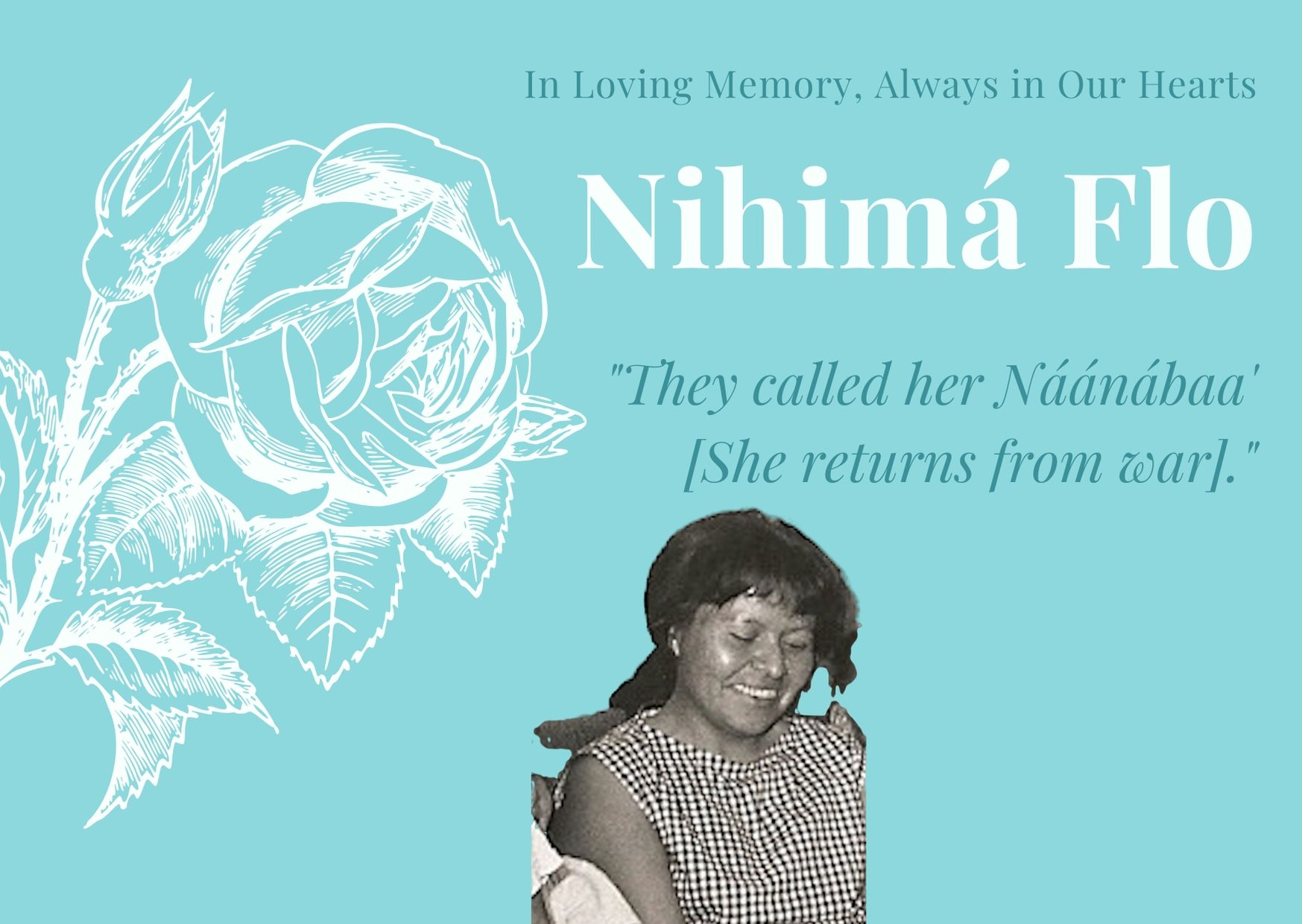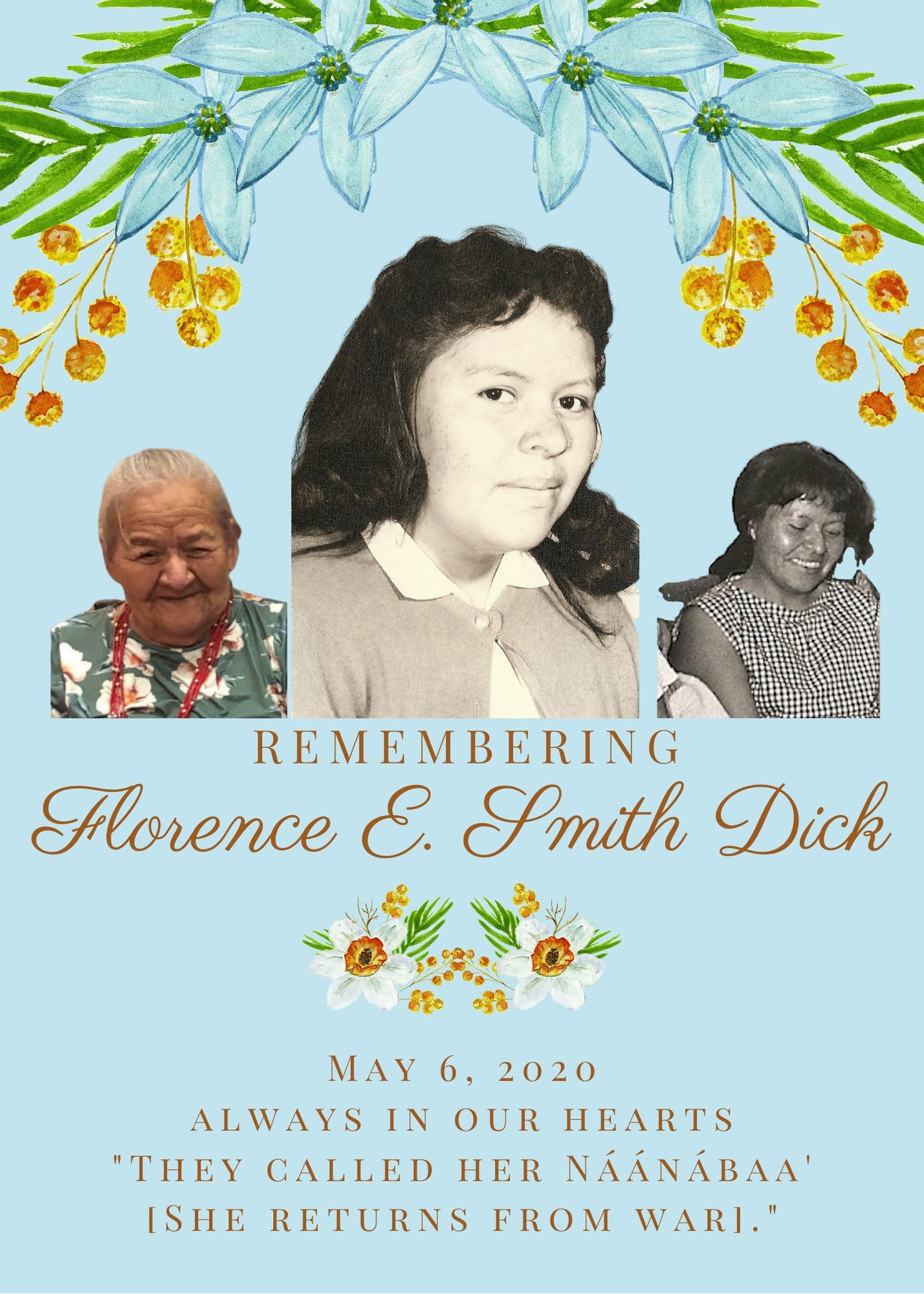They Called Her “Náánábaa” Or “She Returns From War”

Submitted By:
Farina King
Location: Navajo Nation
Story Date: May 6, 2020
Affiliated Tradition:
Church of Jesus Christ of Latter-day Saints
Identity: Diné (Navajo)
In remembrance and honor of nihimá Florence and other victims of Dikos Nstaaígíí-19 (COVID-19). “They called her Náánábaa’ [She Returns from War].” In early May 2020, I had to tell my father that his sister, bádí (“older sister” in Navajo) Florence, was dying from the coronavirus. I woke up that morning, thinking about my aunt and crying. I just knew that she was struggling. Then, my cousin called to tell me that my aunt Florence was getting worse. In tears, my father’s voice quivered when he tried to console me: “It’s okay to cry. We will see her again. She was never baptized. But we will see her again.” Many of my father’s loved ones, like his own father, were never baptized in the Church of Jesus Christ of Latter-day Saints before they passed on. My father, Phillip Smith, joined the church as a young adult, upsetting his Diné (Navajo) father who had hoped that he would follow Diné ancestral ways of healing and ceremony. My father later became a physician, and he has primarily worked in American Indian and Navajo health services. He goes when he can to the temple for his family with faith in eternal life and happiness. Before the church closed the temples, due to the COVID-19 pandemic, my father and mother would go to the temple every week. My father firmly views the temple as a sanctuary and a holy place, while he also recognizes the sacredness of the mountains and homelands that his parents and ancestors taught him. Healing underlies Si’ąh Naagháí Bik’eh Hózhǫ́ (“Long a long life in beauty” or “Walk in Beauty” Diné ideal) as a cycling journey and process of restoring balance and wellbeing. My dad did not become the healer that his father expected him to be, but he has continued the path of healing and walking in beauty that his father would have honored.
This is what I wrote about my Aunt Florence and her beautiful life and struggles of her death in COVID-19 that has strengthened my faith: Florence Elizabeth Smith Dick was born February 6, 1944 toward the end of World War II. Her mother, Johanna Haskeltsie Smith, named her after the city in Italy since her brother Nelson Haskeltsie was wounded and died near there during the war. Florence’s siblings would say that “everybody always favored Florence.” I interviewed my aunt Florence several times—the first time in her Iyanbito home in July of 2008. “I was born on the other side of Rehoboth, I was born at home. On other side of the mountain, where [uncle] Leonard lives now. . . . I grew up below Leonard’s house in Rehoboth. . . . Our clans are Kiyaa’áanii and Tsi’naajinii (Black Streaked Woods people),” she explained to me. She was then taking care of her adorable grandchildren who were running all over the yard. As I interviewed her, Florence continued with her daily tasks. In her home, it was common to see bundles of Navajo tea hanging from the ceiling to dry, and as we talked, she took a dried bundle that had been gathered from her yard, and she placed it into a pot of hot water to make tea.
I always enjoyed visiting Florence because I loved spending time with her adorable grandchildren and their puppies. She told me, thinking about her children: “I want them to get a good education. I want them to find someone who really cares for them, instead of those who just run here and there. . . . I’m glad for taking care of all these kids, if they finish school and get their own jobs. Now, they got their families to think about. I encourage my children to get an education and take responsibility in their life.” My dad remembers sitting with his older sister Florence under the stars as a young child, when they watched quietly. On some nights, they talked about their dreams. When my dad was in high school, Florence told him about her dreams and regrets. She regretted never finishing school, and she encouraged him to continue his studies. She regretted not being able to drive, which she learned one day to do after the introduction of automatic transmission.
In honor of the WWII warriors such as her uncle, her mother Johanna called her, Nááanábaa,’ which means “She returns from war.” On May 6, 2020, she returned from a war against the coronavirus. But the virus was only one struggle that my dear aunt, our mother, faced over her life. She was as constant and peaceful as a gentle river. She continued to flow, to give life and to give of what she could. She cared for children almost all of her life. She lived most of her adult life by the red rocks and hills of Iyanbito, “Buffalo Springs,” where buffalo once roamed. I gave her a necklace with a buffalo pendant in honor of her home, which she wore during the funeral services of her precious son Alexander who passed away in 2012. She cared for her grandchildren; some of them called her “mother.” Of anyone I have ever known in my life, she was always there. She was there when you needed her. She was there, as if she was always just waiting for you. She was waiting for you to come and see her, to visit with her. She did not just talk or tell you what to do. She mostly listened. Like a rock, she was strong, still, and constant. You knew where to find her. She would be there for you.
My parents raised me and my siblings miles away from my aunt and relatives, across the country. Growing up, it was a special occasion to see my relatives. But my father always tried to bring us to visit Aunt Florence. I have early memories of entering her house where she lived and raised children for many years. Florence was always surrounded by children. One of my first memories of my relatives that changed my life was visiting Florence with my dad and siblings, and noticing one of her grandchildren—a baby in a pack n’ play. I recognized then, looking into the deep dark eyes of my baby cousin with Florence beside me, that I was with family. Every time, I was inside her house, I knew that I was with kin. This was our return home, and Florence always welcomed us. Her door was always open to us—to me—years and years after I would return to her. She offered me food when I came. I realized that her children are my siblings, as I returned over and over. Her grandchildren, they are my children in the Diné way.


We are family and she instilled a kindness and gentleness in anyone who spent much time with her, no matter how hard and trying their lives had been. When she started to live in the nursing home, we continued to visit her, still greeted by that beautiful, welcoming smile. Her smile said more than a thousand words. Her gentle eyes calmed my soul. Sometimes, all I could really say was “I love you,” and she would reciprocate that love with a simple, “I love you too.” The last time I saw her was a tender mercy from heaven. I sometimes pass through her town for my work.
In early March 2020, on my way rushing to the airport to catch a flight in Albuquerque, I had a strong impression to stop to see my Aunt Florence. I was worried that I would miss my flight, and I thought that I would be returning to visit longer only a couple weeks later. But the spirit continued to usher me to see my aunt. I nearly passed the exit to her nursing home, before I abruptly changed my mind, realizing that I had to see her, even if just for a moment. I ran into the nursing home to find her in her room, where it was as if she was waiting there to see me. She started to have dementia, but she always looked at me, recognizing me for who I was. She smiled, and as if it was a dream, I hugged her and gave her a bouquet of roses, telling her that I loved her and that I would return soon. She embraced me too, and we said “I love you” in English and in Navajo—“Ayóó ánííníshní.” I never would have expected that an outbreak of COVID-19 would have forced a lock down of the nursing home. The same virus also cancelled my scheduled return trip, and it hit her nursing home within the following weeks. I never imagined that she would get the coronavirus and pass away only a couple months later, and I never thought that that moment with her would be my last time to embrace her.
Although the grief and sorrow of her passing is so painful for our family, especially when we cannot run and embrace each other as we would have done before this pandemic, our hearts and spirits as family continue to connect and support each other. Florence passed on her love, tenderness, and good heart to our family, her children, and posterity. That was her greatest gift—an open heart of tender mercy and love. She may have been very quiet and subtle, but her constancy touched many in countless ways. She shared treats like pickles and fry bread with passersby and relatives. She gathered Navajo tea to make and give away. She joked and talked with family. She used to love to sew and make quilts. She taught those around her through the food, cooking, and basic life lessons. She inspired children to become nurses, to pursue their dreams, while she was their rock and foundation. For me, her legacy and gift was her willingness to open the door to me and acknowledge me as family. If she ever wanted or asked for anything, it was for her children, her many children that she dearly loved. Generous, gracious, kind, and patient, that is how I will always remember her, our Florence. One of her grandchildren, Alexandria Dick, said about her: “One thing that I learned from my grandma was to smile when times are hard because that is what she did. You would never catch my grandma crying. She never showed her pain as well and she fought to her fullest.” Florence was a warrior, Náánábaa’, who fought with kindness and good heart for her family and love. She has returned home from the war, and we will one day reunite and embrace her again.
Share